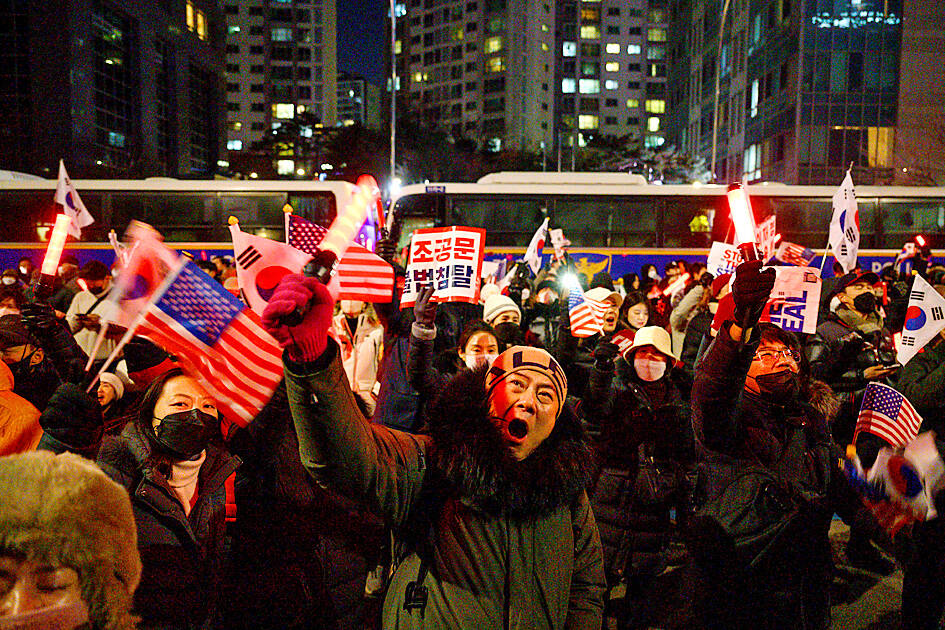Supporters of impeached South Korean President Yoon Suk-yeol yesterday stormed a Seoul court after a judge extended the impeached leader’s detention over his ill-fated attempt to impose martial law.
Tens of thousands of people had gathered outside the Seoul Western District Court on Saturday in a show of support for Yoon, who became South Korea’s first sitting head of state to be arrested in a dawn raid last week.
After the court extended his detention on Saturday, the president’s supporters smashed windows and doors as they rushed inside the building.

Photo: AFP
Hundreds of police officers charged into the court, arresting dozens and denouncing an “intolerable illegal and violent incident.”
The incident is the latest episode in South Korea’s spiraling political crisis since Dec. 3 last year, when Yoon declared martial law and dispatched troops to parliament.
His attempt to suspend civilian rule lasted just six hours after lawmakers defied soldiers to vote it down. They later impeached the president, suspending him from duty.
Yoon has vowed to “fight to the end” despite facing a South Korean Constitutional Court ruling on his impeachment and a criminal probe on insurrection charges that has seen him detained.
In announcing investigators could hold Yoon for a further 20 days, the Seoul court said there were concerns he could destroy evidence if released.
The president thanked his supporters — including evangelical Christians and right-wing YouTubers — for their “passionate patriotism” in a message through his lawyers on Friday.
His backers have claimed Yoon was justified in imposing martial law due to election fraud in legislative polls won last year by the opposition, for which they present no evidence.
They frequently wave US flags and have adopted the “stop the steal” rhetoric associated with US president-elect Donald Trump, whose supporters stormed Washington’s Capitol in 2021 to try to overturn his earlier election defeat.
After the Seoul court incident, acting police chief Lee Ho-young said the force would “thoroughly investigate right-wing YouTubers if they were involved in this violent break-in.”
Yoon’s lawyer Seok Dong-hyeon slammed the court decision, while also warning the president’s supporters not to escalate the situation.
“This is likely not what President Yoon desires,” he said in a statement, adding that violence could also “create burdens” for the president’s future trials.
Yoo Jung-hoon, a lawyer and political columnist, said attacking a court was “unprecedented” in South Korea and those involved would likely face jail time.
The judge was expected to keep the president in prison “given the myriad evidence supporting the insurrection charges,” Yoo said.
“The court also placed significant weight on Yoon’s attempts to destroy evidence” as a head of state, he added.
With Yoon back behind bars after his court appearance on Saturday, prosecutors are due to formalize a criminal indictment for insurrection.
Yoon, who has refused to answer investigators’ questions, could be jailed for life or executed if found guilty.
Yoon has been absent from the parallel probe at the Constitutional Court, which is considering whether to uphold his impeachment.
If that court rules against him, Yoon would formally lose the presidency and elections would be called within 60 days.

Yemen’s separatist leader has vowed to keep working for an independent state in the country’s south, in his first social media post since he disappeared earlier this month after his group briefly seized swathes of territory. Aidarous al-Zubaidi’s United Arab Emirates (UAE)-backed Southern Transitional Council (STC) forces last month captured two Yemeni provinces in an offensive that was rolled back by Saudi strikes and Riyadh’s allied forces on the ground. Al-Zubaidi then disappeared after he failed to board a flight to Riyadh for talks earlier this month, with Saudi Arabia accusing him of fleeing to Abu Dhabi, while supporters insisted he was

‘SHOCK TACTIC’: The dismissal of Yang mirrors past cases such as Jang Song-thaek, Kim’s uncle, who was executed after being accused of plotting to overthrow his nephew North Korean leader Kim Jong-un has fired his vice premier, compared him to a goat and railed against “incompetent” officials, state media reported yesterday, in a rare and very public broadside against apparatchiks at the opening of a critical factory. Vice Premier Yang Sung-ho was sacked “on the spot,” the state-run Korean Central News Agency said, in a speech in which Kim attacked “irresponsible, rude and incompetent leading officials.” “Please, comrade vice premier, resign by yourself when you can do it on your own before it is too late,” Kim reportedly said. “He is ineligible for an important duty. Put simply, it was

The Chinese Embassy in Manila yesterday said it has filed a diplomatic protest against a Philippine Coast Guard spokesman over a social media post that included cartoonish images of Chinese President Xi Jinping (習近平). Philippine Coast Guard spokesman Jay Tarriela and an embassy official had been trading barbs since last week over issues concerning the disputed South China Sea. The crucial waterway, which Beijing claims historic rights to despite an international ruling that its assertion has no legal basis, has been the site of repeated clashes between Chinese and Philippine vessels. Tarriela’s Facebook post on Wednesday included a photo of him giving a

Syrian President Ahmed al-Sharaa on Sunday announced a deal with the chief of Kurdish-led forces that includes a ceasefire, after government troops advanced across Kurdish-held areas of the country’s north and east. Syrian Kurdish leader Mazloum Abdi said he had agreed to the deal to avoid a broader war. He made the decision after deadly clashes in the Syrian city of Raqa on Sunday between Kurdish-led forces and local fighters loyal to Damascus, and fighting this month between the Kurds and government forces. The agreement would also see the Kurdish administration and forces integrate into the state after months of stalled negotiations on